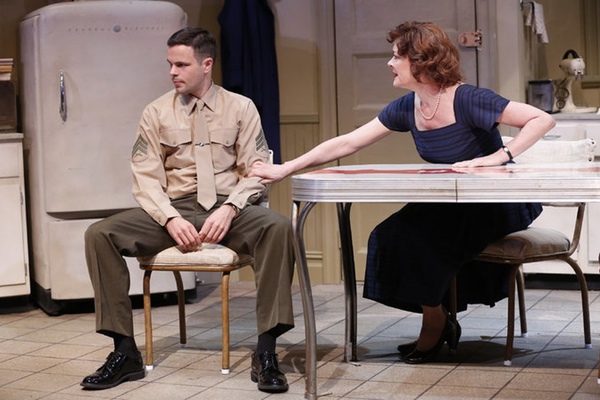From Vietnam to New York City in 1965: From One Jungle to Another

Tens of thousands of Vietnam War veterans returned home in the late 1960s and did not find the welcome their fathers received at the end of World War II. No huge parades, screaming newspaper headlines or the heartfelt thanks of the community. They fought in an unpopular war and came home to student riots, Civil Rights strife and the sexual revolution. Where, oh where, was John Wayne?
That’s what happened to Johnny Barnett in Walter Anderson’s enchanting new play Almost Home, that opened last week at the Acorn Theater on Theater Row in New York. Johnny returned to the Bronx and his small, run-down apartment as a mixed up young man. The army wanted to keep him and offered to make him a Drill Instructor in the States. He wanted to leave the service and go to college. His parents wanted him to accept an offer from a police captain who was a friend and join the NYPD. What to do?
Anderson has drawn Johnny as a rather typical kid who went from a cozy home to a jungle crawling with Viet Cong trying to kill him. In the jungles around Da Nang and Chu Lai he did things he should not have done, things that many soldiers do that they should not do. His misdeeds haunt him. He is shaken to the core by them. They are driving him out of the army. But if he could be a drill instructor, far from the guns…
College beckons. His parents think it is a good idea and so does his neighbor, a teacher. Then the police captain intrudes and insists that he become a cop because he is a war veteran whose chest is full of medals and he can go far in the NYPID, far enough to help the captain with his departmental troubles.
In the middle of all this is his dad, Harry. He is a World War II vet with a slippery connection to the police. Harry was captured and spent time as a prisoner of war and then did something that destroyed his morality, something he never told anybody until that day when Johnny returned and pushed him to talk about it.
The play captures your attention right away. You meet Harry and his wife Grace, who constantly fight. Harry is a mystery and playwright Anderson uses him to start a series of paths for his plot. How does a father raise a son in New York? Comfort him when he discusses his fears? Point him in the right direction in life?
There is a lot of history in the drama, that opens with a wonderful string of 1960s songs. Vietnam never really fades away, especially for the generation of Americans that fought it, or protested it. The play explains both the politics and fighting in Vietnam, a war in which buddies lost a lot of buddies. There are scenes connected to the black market there, too. Most of all, there are the secrets of the war, of any war. What really happened and why can’t so many vets, such as Harry and Johnny, talk about it?
You do wish, though, that the playwright had devoted some of his dialogue to the war’s protesters, the tens of thousands of people who filled the streets from coast to coast to rage against the conflict (‘Hey, hey, LBJ, how many kids did you kill today?”).
One of the many strengths of Almost Home is its universal appeal. Johnny could have just returned from Afghanistan or Iraq. His misdeeds might have taken place in Mosul instead of Chu Lai. His family, too, is any family trying to help their son adjust to living back home once again. They have some of the same problems as the families of all military men and women today.
Director Michael Parva has done a splendid job of staging the play. There is never a slow moment and never a moment when tension does not fill the air. He drives his story toward its conclusion on a very workable set that includes a kitchen and partial office (the kitchen is a perfect replica of an old apartment in the Bronx, by the way). He gets wonderful performances from Jonny Orsini as Johnny, Joe Lisi as Harry, Karen Ziemba as Grace, James McCaffrey as the captain and Brenda Pressley as Luisa, the teacher.
The tragedy of Vietnam was not just the war, but the shabby way in which the veterans were welcomed home. This is yet another look at that turbulent era in United States history and it is a very moving one.
PRODUCTION: The play is produced by The Directors Company. Sets: Harry Feiner, Costumes: Michael McDonald, Lighting: Graham Kindred, Sound: Quentin Chappetta. The play was directed by Michael Parva. Runs through October 12.